The Strategic Trade Bill was crafted to best prevent the spread of nuclear weapons and keep Malaysia and our neighbors safe, while ensuring the protection of individual liberties.
The Strategic Trade Bill is specifically designed to provide control over the trade of materials linked to weapons of mass destruction (WMD), including electronics, avionics and software. The controls form a first line of defence to prevent individuals or companies from using Malaysia as a base in any illegal arms deal.
More importantly, the Bill facilitates closer partnership between Malaysia and the rest of the world in the global fight against terrorism and the proliferation of nuclear, chemical and biological weapons.
We are committed to balancing these priorities as this important bill is implemented in the coming weeks and months.
Please share your thoughts on the Strategic Trade Bill with us.
Read MoreTag Archives: Trade
June 29, 2015 , by admin2
 ASEAN and the US underscored the importance of further strengthening economic ties during the recent visit of five economic ministers, deputy ministers and officials from ASEAN Member States to Seattle and Washington DC from 2-6 May 2010. Malaysia was represented by Dato Sri Mustapa Mohamed, Minister of International Trade and Industry.
In the discussions with United States Trade Representatives, officials, congressmen, business leaders and think tanks in the US, South East Asian Economic Ministers stressed that ASEAN represents a significant market for products and services as well as an investment destination for US. Collectively, ASEAN accounts for 6 per cent of the total trade of US which is the same as the US trade with Japan, and more than US trade with Korea (3 per cent) and India (1 per cent).
ASEAN and the US underscored the importance of further strengthening economic ties during the recent visit of five economic ministers, deputy ministers and officials from ASEAN Member States to Seattle and Washington DC from 2-6 May 2010. Malaysia was represented by Dato Sri Mustapa Mohamed, Minister of International Trade and Industry.
In the discussions with United States Trade Representatives, officials, congressmen, business leaders and think tanks in the US, South East Asian Economic Ministers stressed that ASEAN represents a significant market for products and services as well as an investment destination for US. Collectively, ASEAN accounts for 6 per cent of the total trade of US which is the same as the US trade with Japan, and more than US trade with Korea (3 per cent) and India (1 per cent).June 29, 2015 , by admin2
Malaysia’s International Trade and Industry Minister, YB Dato’ Sri Mustapa Mohamed speaks about the robustness of the Malaysian economy on Asia Business Report, BBC World News, May 2010…
Read MoreJune 29, 2015 , by admin2
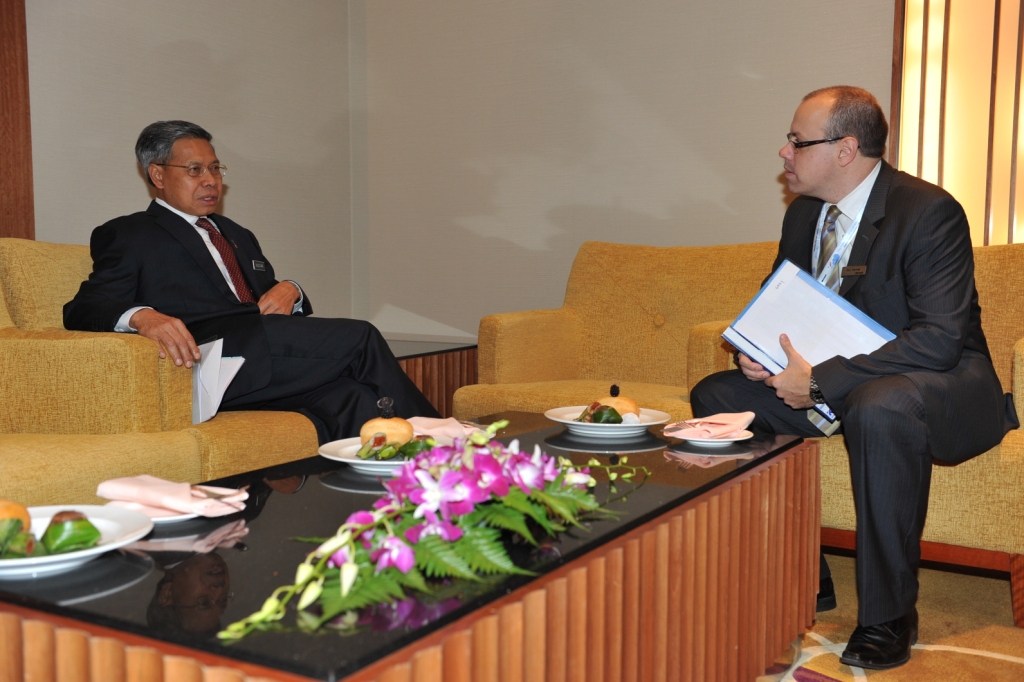
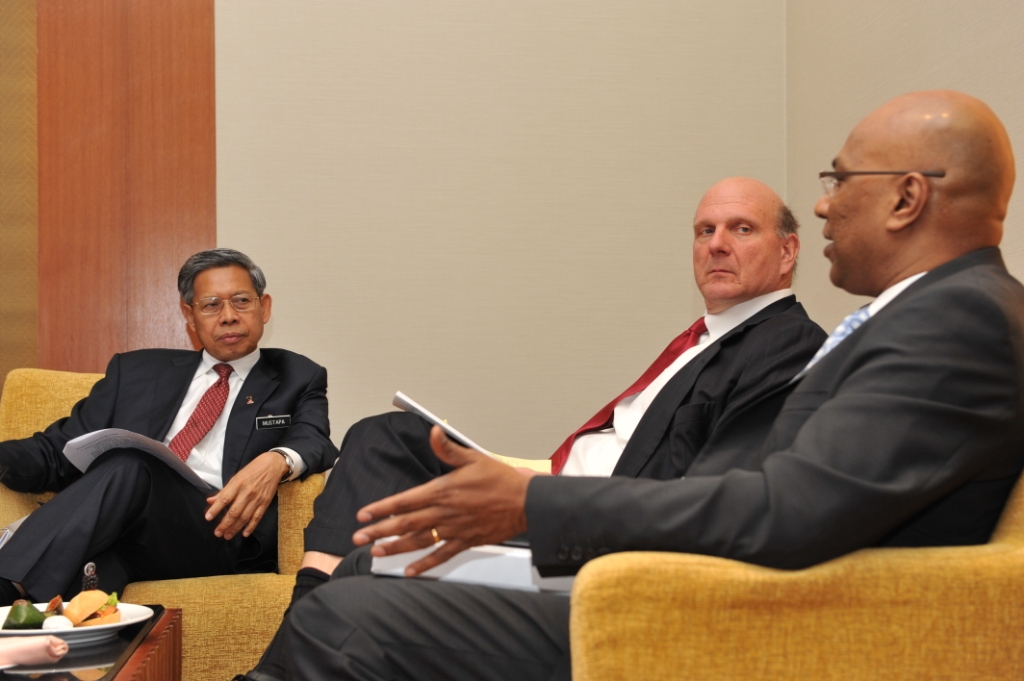
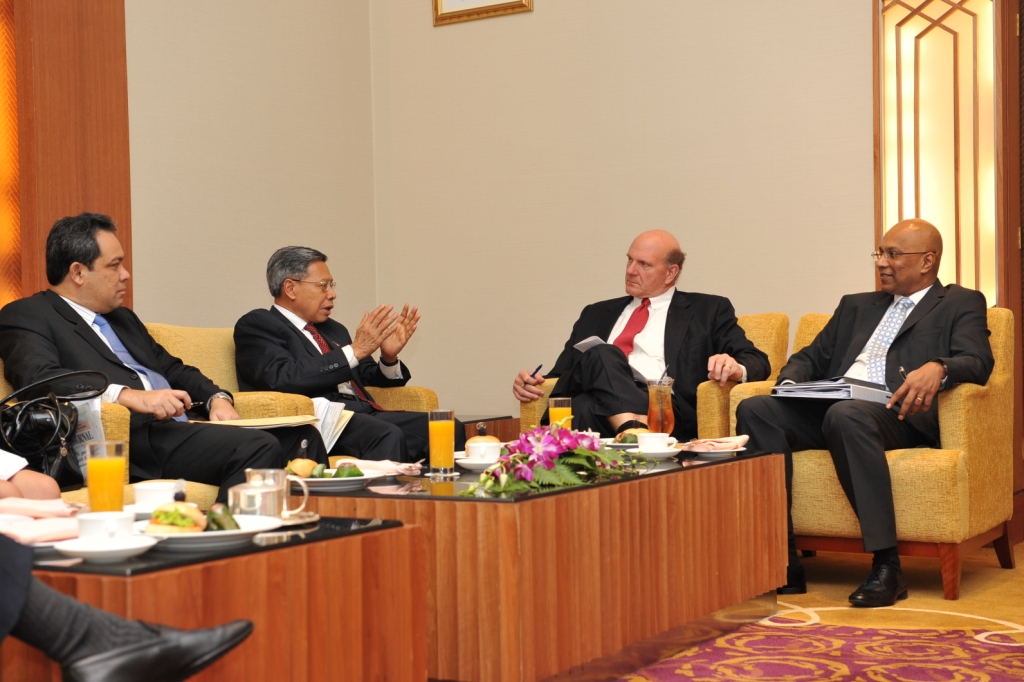
During a meeting with Steve Ballmer, the CEO of Microsoft on 25 May 2010, MITI Minister agreed to explore the formation of a Joint Task Force to complement ongoing efforts to increase the level of technology adoption among small and medium-sized enterprises (SMEs) in Malaysia.“I am pleased that Mr. Ballmer and Microsoft have taken this initiative to work with us. I believe that this joint task force will serve as an important component of our broader efforts to improve Malaysia’s productivity and competitiveness in order to improve the standard of living for all Malaysians.” Said YB Dato’ Sri Mustapa Mohamed.
The scope of the Joint Task Force will include training programmes and outreach activities, among others. One of the focal points of the Task Force will be to create a conducive environment in Malaysia for spreading cloud computing - a technology that makes business computing capabilities available to usersat minimal upfront costs over...
Read MoreJune 29, 2015 , by admin2
We at MITI strongly support and eagerly await the upcoming 13th Annual SME Innovation Showcase SMIDEX 2010, organised by SME Corp. This year’s theme “Pioneering Business Transformation through Innovation” is in line with the New Economic Model (NEM)’s approach of holistic development and growth- ultimately growing from small companies into those with the potential to break into global markets.
The showcase aims to promote innovative products and services in developing competitive and resilient SMEs in Malaysia, focusing on four exciting areas:
Innovation in Technology
Innovation in Packaging & Design
Green Technology & Energy Efficiency
Halal Products and Services
Regarded as one of the premier and most reputable business “one stop” events for SMEs to network and market their innovative products and services among SMEs, large companies and MNCs, SMEs can now explore new market opportunities and technologies to better enhance their capacity and enterprise. The...
Read MoreJune 29, 2015 , by admin2
Y.B. Dato’ Sri Mustapa Mohamed, Minister of International Trade and Industry will attend the APEC Ministers Responsible for Trade Meeting (MRT) in Sapporo, Japan from 5-6 June 2010.
MRT will:
- discuss ways to give impetus to conclude the Doha Development Agenda(DDA) negotiations;
- review the international economic and trade environment and APEC’s efforts in mitigating protectionism;
- evaluate progress made by APEC’s economies in realising free and open trade and investment in the region, in line with the objectives of the Bogor Goals;
- discuss ways to accelerate on-going work programmes and identify new measures to strengthen regional economic integration;
- exchange views on ways to strengthen long-term growth in the Asia Pacific region remised on balanced, inclusive, sustainable, knowledge-based and secure growth; and
- seek new ways to enhance human security with a specific focus on food security, pandemic preparedness and counter terrorism measures.
Malaysia...
Read MoreJune 26, 2015 , by admin2
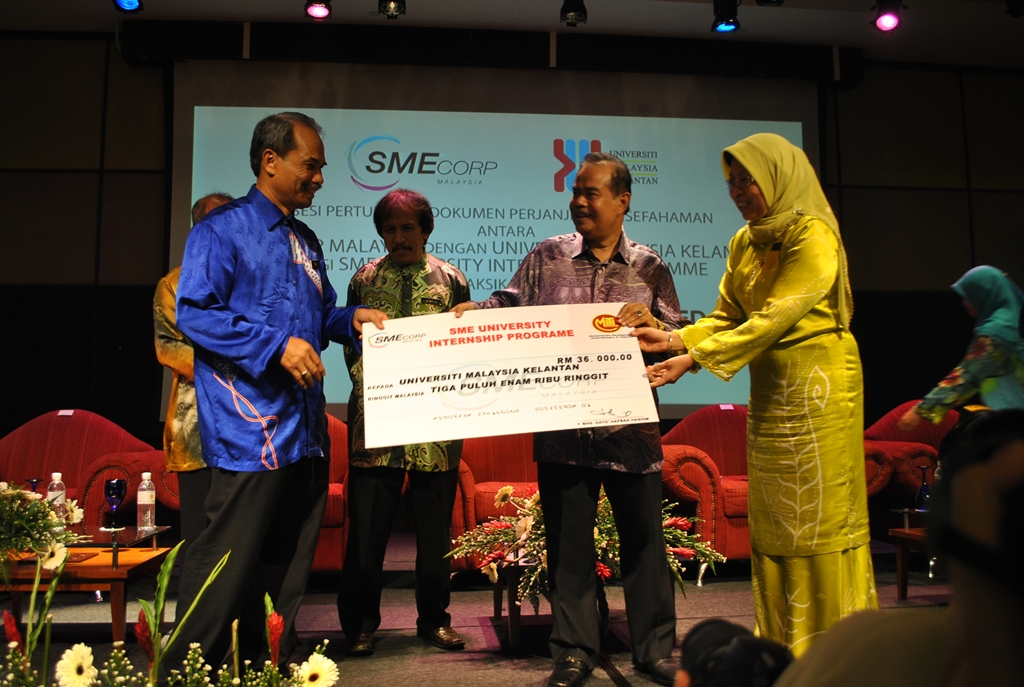
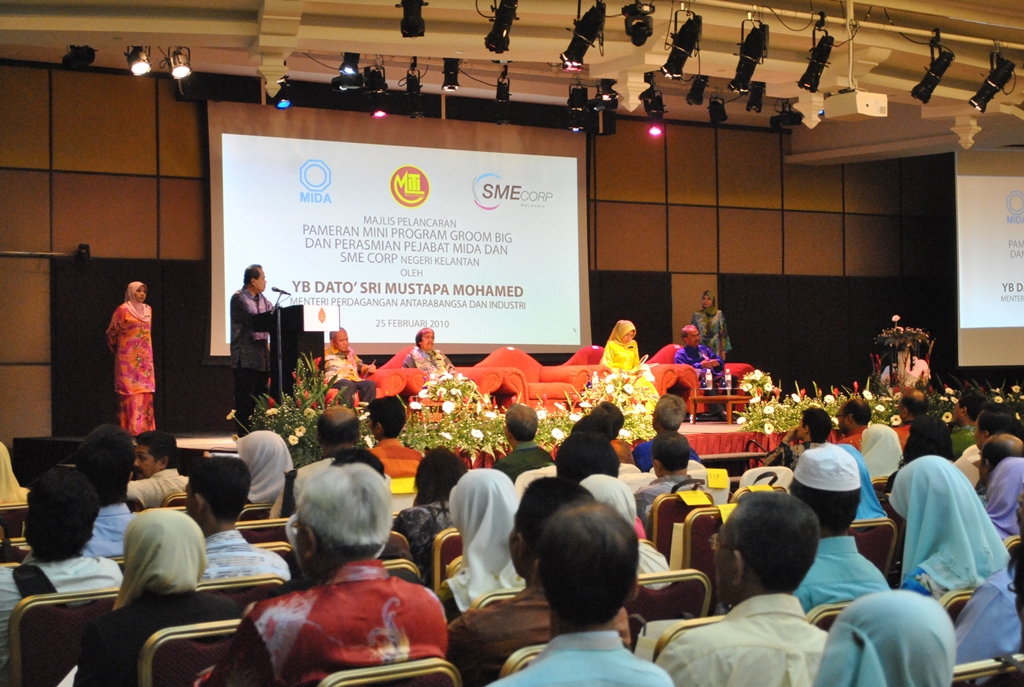
MITI mensasarkan seramai 20 pengeksport Bumiputera dilahirkan setiap tahun menerusi program GroomBig. Pada masa ini, seramai 1,040 usahawan GroomBig sedang dibimbing oleh MITI. GroomBig atau Program Peningkatan Kualiti Produk dan Perkhidmatan ini telah diberi nafas baru dengan lebih banyak program peringkat lebih tinggi diatur untuk membantu usahawan yang dikenal pasti memasuki pasaran eksport.
Sebahagian barangan dihasilkan sudah memasuki pasaran luar negara menerusi kerjasama yang dijalinkan bersama beberapa syarikat perdagangan dan pemasaran di seluruh dunia. Antara syarikat rakan perdagangan MITI termasuk yang berada di Filipina, Dubai, Ireland, Vietnam, Kemboja, dan Britain. Melalui kerjasama strategik ini, barangan usahawan yang dibimbing melalui program GroomBig ini mampu menembusi pasaran negara berkenaan.
Usahawan-usahawan GroomBig akan diberi pendedahan dari segi kemudahan khidmat nasihat, kursus dan khidmat rundingan perniagaan dalam pelbagai...
Read MoreJune 26, 2015 , by admin2
Malaysian companies are fast making inroads into the Laotian market for goods, services and investment as they take advantage of the country’s strong economic performance and policy reforms.
The signing of a Memorandum of Understanding (MoU) and an agreement during the official visit of Y.A.B Prime Minister Dato’ Sri Najib Tun Razak to Lao PDR from 1-3 June 2010 testified to this progress. The MoU was for the construction of the 240MW Don Sahong hydropower project in Champassak province, while the agreement was for the development of a piece of land in Savan-Seno special economic zone, which is operated by a Malaysian company.
Total trade between Malaysia and Lao PDR in 2009 was US$6.8 million (RM24.5 million). Malaysia’s imports included metal and timber products while exports included chemical products, textiles and electrical and electronic goods. While trade flow is still small, Malaysian investments in Lao PDR is on the increase. Malaysia is one of the leading... Read More
June 26, 2015 , by admin2
Malaysia’s overall exports under the FTA preferential schemes during the first quarter 2010 have shown improvement. On 1 January 2010 Malaysia implemented ASEAN-India Free Trade Area (AIFTA) and ASEAN-Australia and New Zealand Free Trade Area (AANZFTA).
During the first quarter of 2010, Malaysia issued a total of 76,929 preferential COs with exports valued at RM22 billion to ASEAN Member States, People’s Republic of China, Republic of Korea, Japan, Pakistan, India, Australia and New Zealand, registering an increase of 43.9% in the number of preferential COs and 53.2% in FOB value compared with the corresponding period of 2009.
With a total FOB value of RM8.5 billion, Malaysia’s exports under AFTA recorded the highest value among the eight FTA preferential schemes in 2010. It was followed by AKFTA (RM6.2 billion), ACFTA (RM3.1 billion), MJEPA (RM1.9 billion), MPCEPA (RM1.3 billion), AJCEP (RM473 million), AANZFTA (RM365 million) and AIFTA (RM252 million).
The overall export...
Read MoreJune 26, 2015 , by admin2
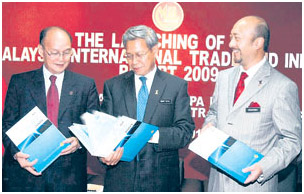
Malaysia felt the impact of the global financial crisis, but through sound policy and hard work began to emerge from the crisis at the end of 2009
The world economy in 2009 underwent a major financial crisis. While the U.S., Europe and Japan were hardest hit, Malaysia did not escape economic contraction, but it was among the first countries to show signs of recovery due to the Government’s timely stimulus measures and sound fiscal policy.
The U.S. experienced a 2.4% contraction in real GDP, Europe’s economy shrunk by 4.1% and Japan saw a 5.2% contraction.
World total merchandise trade was down 23% in 2009, and total commercial services trade declines by 14%.
ASEAN saw slower GDP growth of 1.3% in 2009, compared with 4.4% growth in 2008.
Malaysia’s economy shrunk in the first three quarters of 2009, but grew by 4.4% in the last three months of the year.
Malaysia’s trading volume fell in 2009, in line with the global slowdown, but experienced much smaller...
Read More
 1178 Views
1178 Views